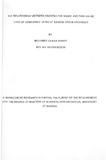| dc.description.abstract | Dividends payment has always been one of the main topics in the studies of Finance scholars. Many researchers have developed and empirically tested various models to explain dividend behavior. Its importance derives from the fact that Dividends are related to the ability of firms to fulfill the needs of various stakeholders. After many years of studies, economists have not reached an agreement on how, and to what extent the Dividend policy of a firm impacts value, performance and governance. However, studies and empirical findings of the last decades have at least demonstrated that Dividend policy has more importance than the simple Miller Modigliani model. This study looks at dividend per share of a firm and its impact on firm value for firms quoted at Nairobi Stock Exchange. The study sought to answer the question. “Does dividend per share influence firm value?” The prime objective of the study is to determine the relationship between dividend per share and firm value and to determine impact of dividend per share on firm value, in attempt to address the question.
The targeted population was all the 55 listed companies at the NSH between the periods 2005 to 2009. The final sample size was made up of 25 companies, all the companies that met the fulfillment of continuously paying dividend were included in the study. The firm should have continuously been paying dividend for all the five years under the period of observation. The companies that did not meet the requirement of continuously paying dividend, not listed , suspended, or has incomplete information during period of study were not considered in the final sample. Data on dividend payment and share price was collected for the five years period of study. Secondary data was used for study and data was sourced from Nairobi stock exchange hand book (2006 & 2009) and data base. Only companies that have continuously been paying dividend and met sample requirement were considered for study. Firm value was represented by share price. To analyze the data, the multiple regression technique method was used to ascertain best fitted model for predicting the dividend per share impact on share price, Independent variable like retained earnings were introduce to avoid bias in testing the relationship as net earnings of companies are split into dividend distributed to share holders or ploughed back into the company with share holder hoping to get more dividend into the future. Lagged price earning ratio and lagged share price ratio were also introduced to test the impact of previous dividends and share price on firm value. To determine the proportion of explained variation in the dependent variable, the coefficient of determination (R2) was worked out. The significance of R2 has been tested with the help of F-Value. The study evaluated stocks that have continuously paid dividend over the period 2005 to 2009 and its effect on firm value.
Results show that Overall for firms quoted at the Nairobi Stock Exchange the impact of dividend per share (DPS) on firm value is stronger than that of retained earnings per share (REPS), when DPS and REPS are the only two explanatory variables. This is represented by the coefficient of regression for DPS 14.818 compared to that of REPS 1.490 a difference of 894.5 %. When lagged price is introduced as a variable, the impact of DPS (14.811) on share price was higher than that of REPS (1.383) by 970.93% represented by the coefficient of regression. When lagged price earning ratio is introduced as a variable The Impact of DPS (7.682) on share price was higher than that of REPS (0.988) by 677.53% represented by the coefficient of regression. It is also found that the impact of DPS and REPS is above the other two explanatory variables lagged price earning ratio and lagged share price. Industry wise study reveals mixed results. Apart from agricultural sector, for all other sectors DPS had a stronger impact on share price when compared to REPS represented by coefficient of regression. The difference in percentages between DPS and REPS was 1747.21%, 289.28%, 136.39 and 881.35% for commercial and service sector, Finance & investment, Industrial & allied and AIMS respectively. It is also found that the impact of DPS and REPS is above the other two explanatory variables lagged price earning ratio and lagged share. In conclusion the DPS of the listed firms do not play an important role in determination of firm value in all industries. | en_US |



